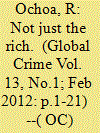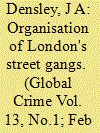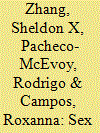|
|
|
Sort Order |
|
|
|
Items / Page
|
|
|
|
|
|
|
| Srl | Item |
| 1 |
ID:
109856


|
|
|
|
|
| Publication |
2012.
|
| Summary/Abstract |
This article explores the development of kidnapping in Mexico City. New evidence suggests that this crime has evolved from a crime that until recently targeted mostly the wealthy to one that now targets mainly middle- and working-class individuals. This is counterintuitive since, arguably, kidnapping is a costly crime to plan and execute and is thus better suited for a once-off large payoff. Typical explanations of high crime rates and other criminal phenomena in Latin America argue that either a weak state or very powerful criminals explain high levels of crime and violence. I argue for a middle-ground approach that looks at the interactions between state, criminals and society to explain the changes mentioned. Using qualitative evidence, I explain this shift in kidnapping along three lines: (1) the successful destruction by the state of older, sophisticated kidnapping gangs; (2) the formal and informal strategies that wealthy individuals designed and implemented to protect themselves from crime; and (3) the failure of the state to impose a strong rule of law. The article concludes by reflecting on the importance of deep structural reform as a way to assure long-lasting drops in crime.
|
|
|
|
|
|
|
|
|
|
|
|
|
|
|
|
| 2 |
ID:
109858


|
|
|
|
|
| Publication |
2012.
|
| Summary/Abstract |
This article examines a grossly neglected area of the street gang literature: the nature and extent of gang organisation. Based upon fieldwork with gangs in London, UK, this article illustrates how recreation, crime, and enterprise are not specific gang 'types', but rather represent sequential stages in the evolutionary cycle of gangs. This article demonstrates not only how gangs typically begin life as neighbourhood-based peer groups, but also how, in response to external threats and financial commitments, gangs grow to incorporate street-level drug distribution businesses that very much resemble the multi-level marketing structure of direct-selling companies. Gang organisation, in turn, becomes a function of gang business. Gang organisation is conceptualised here on three levels: internal, external, and symbolic. This article examines, respectively, the presence of subgroups, hierarchy and leadership, incentives, rules, responsibilities, and punishments within gangs; how gangs interact with the local and larger community; and how gangs associate with symbolic elements of popular culture in order to convey reputation and achieve intimidation.
|
|
|
|
|
|
|
|
|
|
|
|
|
|
|
|
| 3 |
ID:
109857


|
|
|
|
|
| Publication |
2012.
|
| Summary/Abstract |
Much has been written in the English-speaking world on the topic of sex trafficking, but little is known about what researchers elsewhere have produced on this topic. An exhaustive literature search was conducted to locate publications on this topic from Latin America. A total of 74 publications were located and put through a systematic content analysis. Four main discernible patterns were noticed: (1) the vast majority of the publications were produced by individuals affiliated with international or non-government organisations; (2) the production of trafficking-related literature sharply declined after 2007; (3) of the small number of studies involving empirical data, most were qualitative in nature; and (4) the literature was primarily focused on the sexual exploitation of children. The discourse on sex trafficking in Latin America appeared to be dominated by advocacy groups. There were few scholarly articles, suggesting limited attention from the academic community. Despite limited empirical data, many Spanish-speaking authors made claims on the nature and extent of sex trafficking, with articles citing one another as source of evidence. This review finds a great need for the involvement of the academic community and for dispassionate and empirically grounded research on sex trafficking.
|
|
|
|
|
|
|
|
|
|
|
|
|
|
|
|
|
|
|
|
|